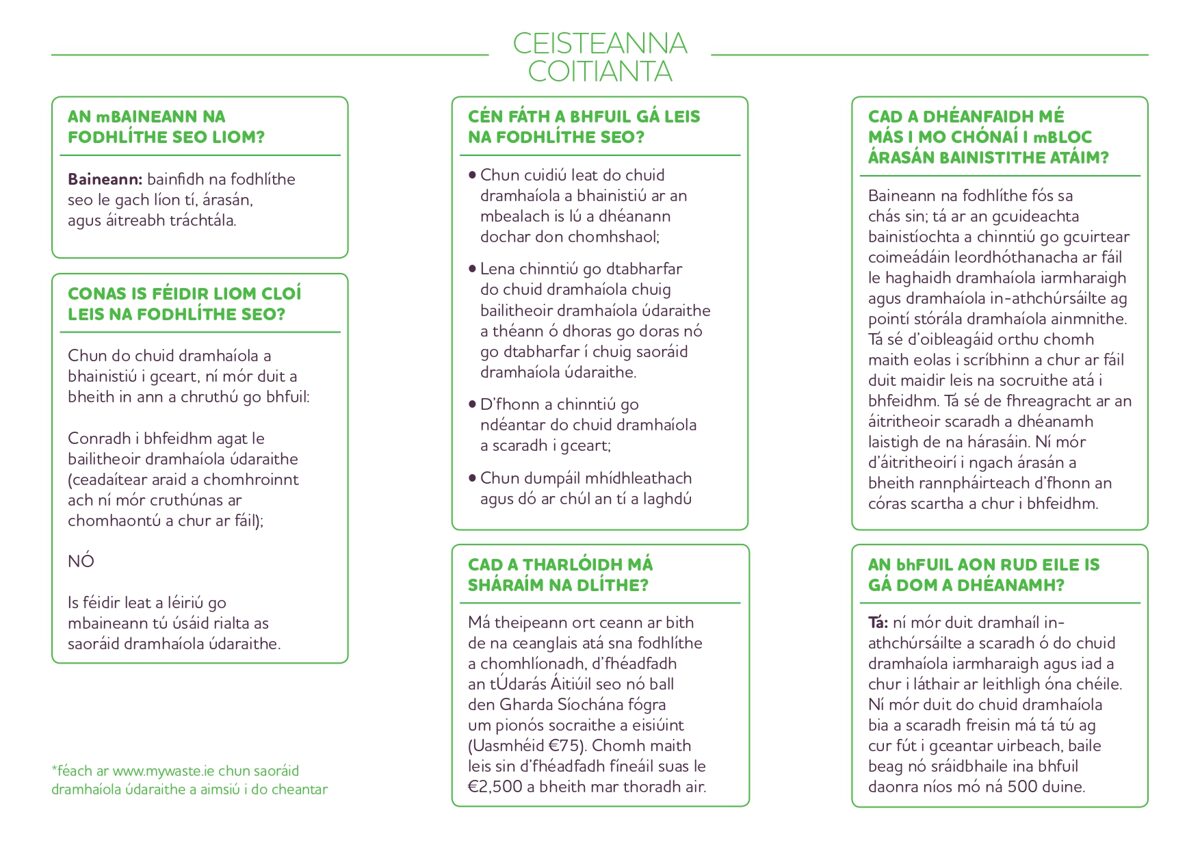Household Waste Bye-Laws: The Irish Approach
Source: household waste bye laws - mywaste My Waste
Household Waste Bye-Laws
These bye-laws govern a range of issues, including obliging consumers to participate in an authorized waste collection service or provide documentary proof on what alternative means they use to dispose of their waste and encouraging greater segregation of waste to reduce volumes of residual waste collected.
These bye-laws govern a range of issues, including obliging consumers to participate in an authorized waste collection service or provide documentary proof on what alternative means they use to dispose of their waste and encouraging greater segregation of waste to reduce volumes of residual waste collected.
This means that from now on, every household must be able to prove that they have a contract in place with an authorized waste collector or that they regularly use a civic amenity site or recycling center. By correctly managing your waste you will:
- Make an important contribution to meeting the climate challenge
- Improve the quantity and quality of recyclable* material collected
- Reduce the amount of waste going to landfill and incineration
- Help conserve planet Earth’s finite resources


The Technical Stuff
Local Authorities across Ireland have or will be adopting similar Bye-Laws which will ensure a consistent approach to managing waste across the country.
Who do these bye-laws apply to?
These bye-laws apply to all households, apartments and commercial premises.
Why do we need these bye-laws?
- To help you manage your waste in an environmentally acceptable manner
- To ensure that your waste is only given to an authorised door-to-door waste collector or brought to an authorised waste facility e.g. civic amenity sites*
- To help ensure your waste is correctly segregated*
- To reduce illegal dumping and backyard burning.
- By correctly managing your waste you will:
- Make a contribution to meeting the climate challenge
- Improve the quantity and quality of recyclable* material collected
- Reduce the amount of waste going to landfill and incineration
- Help conserve planet Earth’s finite resources
How do I comply with the bye-laws?
In order to manage your waste correctly you must either:
- Have a contract in place with an authorised door-to-door waste collector
- Have a bin sharing agreement in place ensure that the account holder has provided you with proof of agreement
- Demonstrate regular use of an authorised waste facility e.g. civic amenity site*.
Whichever option you chose, you must be able to provide documentary evidence, such as receipts, statements or other proof of payment or for bin sharing a signed letter of consent from the person who holds the contract.
I only produce a small amount of waste, how do I comply?
We would advise that bin sharing is the best option in this instance. A letter from the account holder will be sufficient evidence, this account holder will then be obliged to provide evidence of a contact with a permitted waste collector.
What else do I have to do?
You must segregate recyclable waste from your residual waste and present these separately. Note: If you are living in an urban area, small town or village with a population of over 500 you must also segregate your food waste*.
When using a permitted door-to-door waste collector you must ensure that;
- Your waste is presented for collection in a wheeled bin on the day designated by your collector. The wheeled bin cannot be presented for collection before XXX pm on the day preceding the collection and must be removed no later than XXXpm on the day of collection. (bags are only permitted in areas designated by The County Council).
- The wheeled bin (or bag where permitted) presented for collection, must:
- Be maintained in a good state of repair.
- Not be overfilled.
- Not contain any hazardous waste e.g. batteries, aerosols.
- Not contain waste electrical and electronic equipment.
- Be removed from the kerbside when the collection has been completed.
How do I comply if I live in an apartment?
If you live in an apartment, the bye-laws apply to you as described above. The bye-laws require your management company/apartment owner to ensure adequate containers are provided for all segregated waste fractions within the apartments designated waste storage point. You are obliged to segregate waste within your own apartment.
What happens if I don’t comply?
Failure to comply with any of the requirements of the bye-laws may result in a Fixed Payment Notice (Maximum €75) being issued by a member of XXX County/City Council or a member of An Garda Siochana or a fine on conviction of up to €2,500.